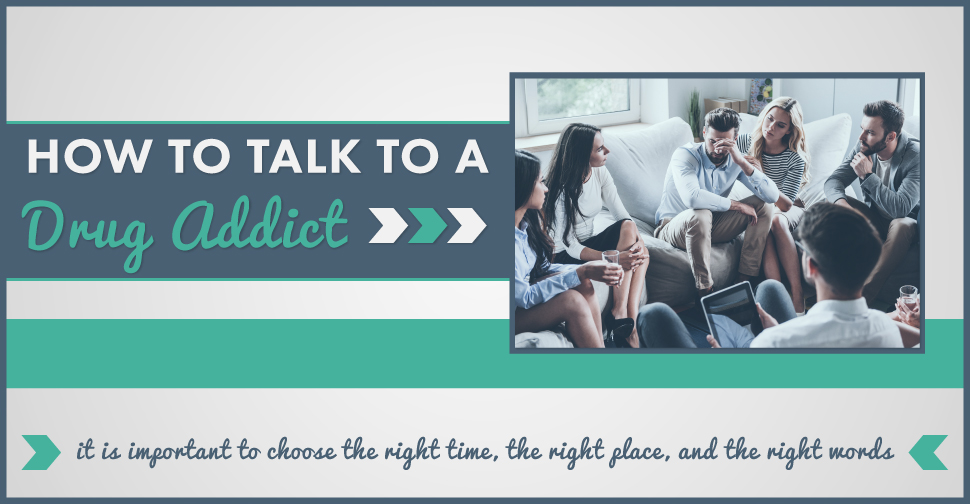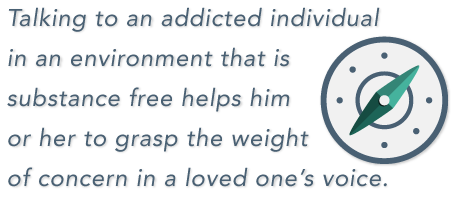
In America, the number of people who abuse substances is well into the millions. That means a person struggling with addiction could be your neighbor, your friend, your spouse, your parent, or your daughter or son. There is no question that substance abuse has been an issue in our society for some time. What may be difficult, though, is figuring out how to approach those persons affected by addiction and talk to them about their disorders.
While you may have the best of intentions, the effects of these substances and high tensions may cause a person to refuse to hear you. That is why, when talking to a person afflicted with addiction, it is important to choose the right time, the right place, and the right words.
Substance Abuse—Identifying The Disorder
If you are considering seeking help for or approaching a person about a drug or alcohol addiction, first it is necessary to be sure you recognize signs of abuse. Some signs or behaviors an individual may display that are indicative of addiction include the following, according to Mayo Clinic:
- A need to use substances on a regular basis (whether daily or several times a day)
- Experiencing strong urges or cravings to seek or use the substance
- Developing a tolerance; needing to take more of a substance to experience the same “high”
- Seeking the substance at all costs, both personal and financial
- An interference with school, work, or personal responsibilities
- Engaging in risky behavior
- A failure to stop abusing the substance
- Undergoing withdrawal after stopping use of a substance
If you witness any of these signs in someone you love, please don’t hesitate—your loved one may be struggling with an addiction, in a capacity that could jeopardize their health or their life.
How To Approach Someone About Substance Abuse
There are several approaches one can take to address concerns about a substance use disorder. But before doing this, it is necessary to mentally prepare. For instance, it may be helpful to remember certain key things—just because a person has a substance use disorder, does not mean they are a bad or weak person. It may also be wise to take into account the personality of the person you’re approaching—is the person withdrawn or open? In any case, effects of certain substances can make a person combative or hostile. Grasping concepts may be difficult under the influence of substances, so it may be best not to talk to a person while he or she is “high.”
 After considering these things, choose a time carefully. Again, broaching a sensitive, pertinent topic such as this may not be wise while a person is high. But talking to a person while he or she is hungover or experiencing the aftereffects may work since the substance abuse is fresh, and it is likely they are feeling ill, or even encountering regret. This might help them to see the error and damage of their ways. In other cases, this may not work. Instead, a sober time free from pressures of work, school, or family may be the right option.
After considering these things, choose a time carefully. Again, broaching a sensitive, pertinent topic such as this may not be wise while a person is high. But talking to a person while he or she is hungover or experiencing the aftereffects may work since the substance abuse is fresh, and it is likely they are feeling ill, or even encountering regret. This might help them to see the error and damage of their ways. In other cases, this may not work. Instead, a sober time free from pressures of work, school, or family may be the right option.
Location is also important. Talking to an individual in an environment that is substance free helps him or her to grasp the weight of concern in a loved one’s voice. Further, it will allow the person to think clearly without the ready availability of drugs or alcohol.
Voicing Concerns For Substance Abuse
To begin, you could reference your relationship with them and express how deeply you care about him or her. Remind the person of trips together, memories shared, work or school events, and tell the person how much it means to you, to have him or her in your life. These positive memories may also serve to illustrate to them how good a sober life can be. When you have helped to establish a visual image of your strong bond, gently break the issue of your concern.

Tell him or her how their actions worry you, or how you have watched over time as abuse became addiction. You can even tell them how their addiction is negatively impacting you or your family, however, be mindful of refraining from exhibiting judgement or blame, as this could shut them down. Sometimes a person may not be ready to face the extent of the drug use on their life, however, being witness to the toll it is taking on their loved ones may be a catalyst towards change. Finally, tell the person the last thing you want is to lose them, or see them hurt.
If necessary, or if you feel your loved one would receive it well, you could reach out to professionals in your area, such as an AA leader or substance abuse counselor. If you feel this would be too much to handle in person, you could obtain contact information to present to your loved one, or even contact the professional and see if he or she would agree to be on call if needed. Lastly, it can be helpful to assemble resources on treatment programs. If things go well, and they see the danger of their ways, it can be extremely beneficial to have options available, including outpatient or inpatient drug rehab programs.
Staging An Intervention
Perhaps you’ve utilized the tips we’ve noted above within a general conversation. Sometimes, in more severe cases of addiction, it may be a good idea to stage an intervention. Though these may be organized and implemented by friends or family members, we strongly recommend that you enlist the aid of a professional. This individual is called an interventionist.
The interventionist is responsible for planning, strategizing, and staging the intervention. Their professional insight and guidance can be priceless in this situation. They also take on a valuable role as a moderator, an important benefit you don’t have if you are going it alone. Within this structured and safe space, you are allowed an opportunity to express your thoughts and concerns to your love one in a constructive manner. Also, the interventionist will help to prepare you to face the possibility that your loved one might not want treatment, by equipping you with coping skills and options.
What If My Loved One Does Not Want Help?
Substance abuse is a grueling disorder that changes a person’s brain to align it with compulsive drug seeking. For this reason, many people are not ready to admit they need help, or that they are even battling a disorder. If this happens when you approach your loved one, do not lose hope.
First, try not to give up on that person. Further, try not to allow substance abuse to keep you from your loved one. Instead, offer ways to help that person that takes him or her far from substance-heavy environments, and keep any substances hidden if the person visits.

It may be helpful to seek counseling or a support group yourself. Not only will this help you to stay centered and strong, but it will exhibit to them that their actions are impacting your life. It may also stand as a proactive and positive example towards change that might inspire them to contemplate doing the same within their life.
Lastly, make sure the person knows you are there if he or she ever wants help. Perhaps you can give the person some time and try again. Should the person ever seek treatment, he or she will need a strong support system, and in this way you could be of great help.
Finding Help For Your Loved One
 If you are reading this because you are seeking answers for how to help your loved one, you are not alone in your quest. Millions of people every year need help for some form of substance abuse, and only a small percentage actually receive the help they need. Do not let your friend, family member, co-worker, or your neighbor fall into the statistic of those who desperately need help. Contact us today at DrugRehab.org to find more information, speak to professionals about how you can help, and get connected with resources.
If you are reading this because you are seeking answers for how to help your loved one, you are not alone in your quest. Millions of people every year need help for some form of substance abuse, and only a small percentage actually receive the help they need. Do not let your friend, family member, co-worker, or your neighbor fall into the statistic of those who desperately need help. Contact us today at DrugRehab.org to find more information, speak to professionals about how you can help, and get connected with resources.
Sources
Mayo Clinic—Drug Addiction Symptoms
National Institute On Drug Abuse—DrugFacts: Treatment Statistics
